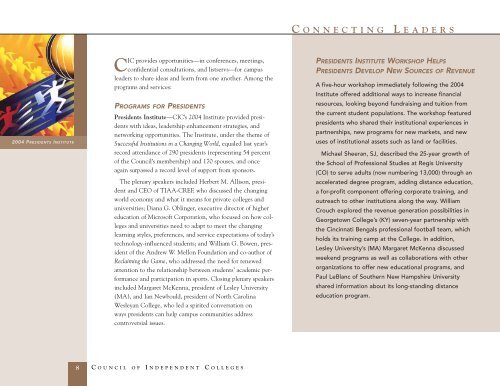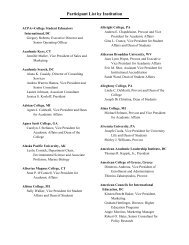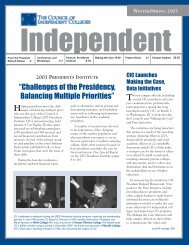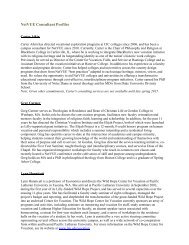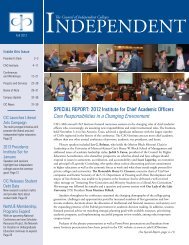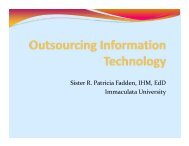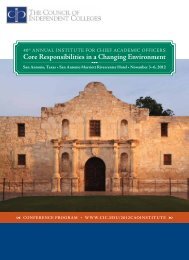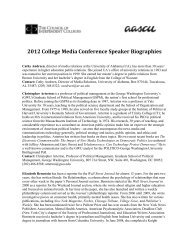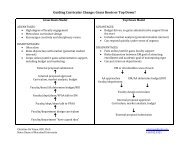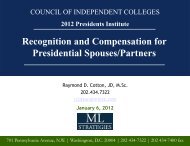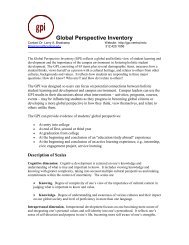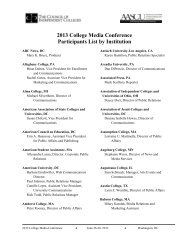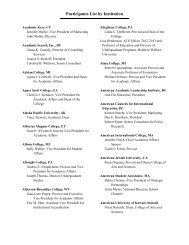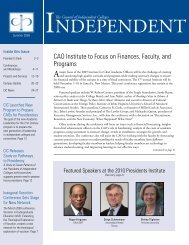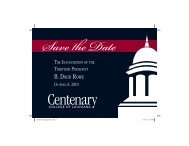Annual Report 2003-2004 - The Council of Independent Colleges
Annual Report 2003-2004 - The Council of Independent Colleges
Annual Report 2003-2004 - The Council of Independent Colleges
- No tags were found...
You also want an ePaper? Increase the reach of your titles
YUMPU automatically turns print PDFs into web optimized ePapers that Google loves.
C ONNECTINGL EADERS<strong>2004</strong> PRESIDENTS INSTITUTECIC provides opportunities—in conferences, meetings,confidential consultations, and listservs—for campusleaders to share ideas and learn from one another. Among theprograms and services:PROGRAMS FOR PRESIDENTSPresidents Institute—CIC’s <strong>2004</strong> Institute provided presidentswith ideas, leadership enhancement strategies, andnetworking opportunities. <strong>The</strong> Institute, under the theme <strong>of</strong>Successful Institutions in a Changing World, equaled last year’srecord attendance <strong>of</strong> 290 presidents (representing 54 percent<strong>of</strong> the <strong>Council</strong>’s membership) and 170 spouses, and onceagain surpassed a record level <strong>of</strong> support from sponsors.<strong>The</strong> plenary speakers included Herbert M. Allison, presidentand CEO <strong>of</strong> TIAA-CREF, who discussed the changingworld economy and what it means for private colleges anduniversities; Diana G. Oblinger, executive director <strong>of</strong> highereducation <strong>of</strong> Micros<strong>of</strong>t Corporation, who focused on how collegesand universities need to adapt to meet the changinglearning styles, preferences, and service expectations <strong>of</strong> today’stechnology-influenced students; and William G. Bowen, president<strong>of</strong> the Andrew W. Mellon Foundation and co-author <strong>of</strong>Reclaiming the Game, who addressed the need for renewedattention to the relationship between students’ academic performanceand participation in sports. Closing plenary speakersincluded Margaret McKenna, president <strong>of</strong> Lesley University(MA), and Ian Newbould, president <strong>of</strong> North CarolinaWesleyan College, who led a spirited conversation onways presidents can help campus communities addresscontroversial issues.PRESIDENTS INSTITUTE WORKSHOP HELPSPRESIDENTS DEVELOP NEW SOURCES OF REVENUEA five-hour workshop immediately following the <strong>2004</strong>Institute <strong>of</strong>fered additional ways to increase financialresources, looking beyond fundraising and tuition fromthe current student populations. <strong>The</strong> workshop featuredpresidents who shared their institutional experiences inpartnerships, new programs for new markets, and newuses <strong>of</strong> institutional assets such as land or facilities.Michael Sheeran, SJ, described the 25-year growth <strong>of</strong>the School <strong>of</strong> Pr<strong>of</strong>essional Studies at Regis University(CO) to serve adults (now numbering 13,000) through anaccelerated degree program, adding distance education,a for-pr<strong>of</strong>it component <strong>of</strong>fering corporate training, andoutreach to other institutions along the way. WilliamCrouch explored the revenue generation possibilities inGeorgetown College’s (KY) seven-year partnership withthe Cincinnati Bengals pr<strong>of</strong>essional football team, whichholds its training camp at the College. In addition,Lesley University’s (MA) Margaret McKenna discussedweekend programs as well as collaborations with otherorganizations to <strong>of</strong>fer new educational programs, andPaul LeBlanc <strong>of</strong> Southern New Hampshire Universityshared information about its long-standing distanceeducation program.8C OUNCIL OF I NDEPENDENT C OLLEGES


